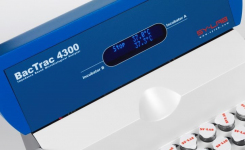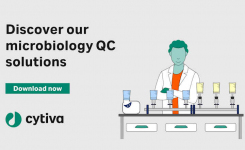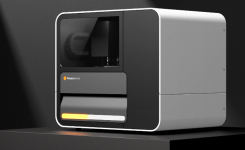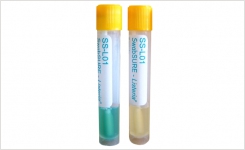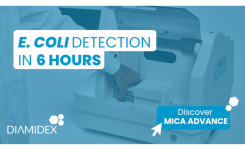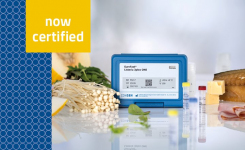Bacterial Identification Using MALDI BioTyper™ system
go back to news archivesIdentification and classification of microorganisms can now be achieved using protein 'fingerprints' measured by MALDI-TOF mass spectrometry. The characteristic protein expression patterns of microorganisms, such as bacteria, yeasts and fungi, can be analyzed with the new MALDI BioTyper™ system from Bruker Daltonics which will on show at Pittcon 2006.
The remarkable reproducibility of the MALDI BioTyper is based on the measurement of high-abundance proteins, including many ribosomal proteins. As ribosomal proteins are part of the cellular translational machinery, they are present in all living cells. As a result, the MALDI BioTyper protein fingerprints are not significantly influenced by variability in environmental or growth conditions. This is a crucial advantage of this new microbiology method, as it allows the generation of robust MALDI BioTyper libraries of microorganisms.
The MALDI BioTyper represents an excellent complement to classical microbiological identification and classification techniques, and to modern PCR-based techniques. In contrast to other approaches, the MALDI BioTyper does not require any initial assessment like gram staining, oxidase test of unknown samples, choice of PCR primers or usage of selective growth media. Applications of the MALDI BioTyper include taxonomical research on microorganisms, infectious disease research, as well as microorganism detection and identification in environmental analysis, food safety and water quality.
Using standardized MALDI BioTyper methods, after an overnight culture growth, cell material can either be directly transferred onto a MALDI-TOF target plate, or it can be analyzed after a rapid organic extraction procedure. Excellent reproducibility can be achieved routinely even by inexperienced users. Easy and cost-effective sample preparation combined with rapid TOF data acquisition in seconds allows the analysis of hundreds of samples within a day. Redundant measurements are possible to further increase the level of confidence.
The MALDI BioTyper bioinformatics package performs the microorganism identification and classification based on MALDI-TOF proteomic signatures. The MALDI BioTyper software carries out all necessary data processing steps leading from raw spectra to peak lists. The generation of reference spectra for individual strains is automated, but the software also allows for expert interaction. Microorganism identification is performed by pattern matching between reference spectra and MALDI-TOF profiles of unknown strains. The analysis results are visualized in an intuitive graphical user interface.
In addition to enabling the identification of known microorganisms, the MALDI BioTyper software offers a variety of advanced algorithms for the characterization of unknown microorganisms, including clustering and phylogenetic dendrogram construction. This unique feature allows the protein signature classification of unknown species and strains, and uniquely complements taxonomical and phylogenetic approaches, such as ribosomal DNA sequencing. The MALDI BioTyper typically achieves identification at the genus or species level. In many cases even different microbial strains can be distinguished.
Source : Bruker Daltonics Inc View Company Information
Posted on March 13, 2006






